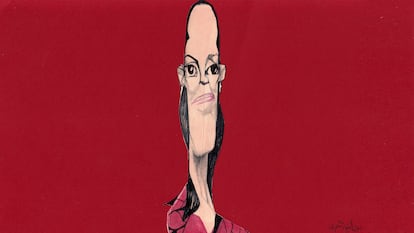Claudia Sheinbaum, the science of politics
The former head of the Mexico City government has become Mexico’s first female president, it remains to be seen how far away she veers from her predecessor and political mentor

One night, at the end of 2020 — in one of the most turbulent, pre-vaccine moments of the Covid-19 pandemic in Mexico — the head of government of the capital, Claudia Sheinbaum, showed up without prior notice to the operations center, where emergency reports were being attended to. She greeted the officials, thanked them for their work… and took one of the seats. Then, she began to do the same work as the rest of the dispatch staff: answering calls, assigning ambulances and finding beds for the sick in the hospitals.
According to Pepe Merino, a political economist and one of her closest collaborators, until four in the morning, the head of the government of Mexico City was just another emergency operator, doing the work anonymously. There were no photos of her shift.
“She didn’t do it to be seen,” Merino affirms. “It was very motivating to see her do the same thing as everyone else. She has a deep commitment and a moral and ethical clarity that leaves you with no room for doubts or ambivalence [about her].”
Sheinbaum — a left-wing scientist with advanced degrees in Physics and Environmental Engineering — has just become Mexico’s first female president. This is a historic feat for women in the country’s two centuries as an independent republic. Those who know her say that the ruling party’s candidate and president-elect — whom they reverently refer to as “La Doctora,” because of her doctorate and career in academia — is a tireless worker. To make decisions, she relies on data and evidence; she listens to her staff and advisors, reflecting on their thoughts. She doesn’t rush and she’s very frank in her opinions, always giving a firm “yes” or “no.”
While Sheinbaum delegates tasks to her appointees, she’s a perfectionist, following up on their work and supervising it until the end. She’s forceful, but engages in debates with great respect. As an adversary, she’s generous and holds no grudges. And, when you get to know her — according to a dozen testimonies collected by EL PAÍS, including from personal friends, staffers and her biographers — she shows warmth and concern for others, offering hugs and good humor.
During the 2024 presidential campaign, the 61-year-old former head of government of Mexico City has faced accusations from the opposition about her seriousness and apparent toughness. She has also been questioned about how independent she will be with respect to the outgoing president — Andrés Manuel López Obrador — who has been the most important leader of the Mexican left of the last two decades. Those close to her affirm that this criticism is unfounded. One of her biographers — journalist Jorge Zepeda — recalls an anecdote with the candidate while he was writing a book about her life: ”At one point I asked her: ‘If you had to sum it up, what would be the uniqueness of your six-year term?’ She told me: ‘I’m someone who makes decisions based on data.’”
On the other hand, Zepeda notes, for López Obrador, party loyalty takes precedence in decision-making. “If [a piece of] data gets in the way, another piece is chosen,” he observes. He draws a clear contrast between two of them: a person of science — such as Sheinbaum — “cannot disregard information that contradicts her hypothesis.”
The candidate for MORENA — the ruling party, founded by López Obrador — was born in Mexico City in 1962. Descended from Jewish grandparents who emigrated from Europe, she grew up in a middle-class family, in an environment with access to culture and open to leftist political influences. Her youth took place during turbulent years in Mexico, in which the PRI regime — which ruled uninterruptedly from 1929 until 2000 — violently repressed social movements. Sheinbaum’s parents received intellectuals and political leaders at their home in the evenings. And, in the 1970s, Sheinbaum herself would be part of the student movement of the National Autonomous University of Mexico (UNAM) that opposed the privatization of public education. She gained prominence and became one of the leaders. She got married while earning a degree in Physics, had a daughter and raised the son of her then-husband.
Between the 1980s and 1990s, Sheinbaum found a balance between university protests, her academic training and raising a family. She earned a doctorate in the United States and, upon returning to Mexico, became one of the pioneers in conducting climate change studies.
She made the leap to public service in 2000, when López Obrador was elected head of the Government of Mexico City. He appointed her to be the capital’s secretary of the environment, with the task of reducing pollution in the capital. As López Obrador began his rise to political leadership, he sheltered Sheinbaum within his inner-circle. He not only saw her as a companion in social protests: he saw her, above all, as an effective administrator.
Zepeda observes that Sheinbaum didn’t grow up as part of the opposition, nor as a persecuted politician. He points out that this has shaped her way of understanding the exercise of power as being more of a challenge of public administration. “She mixes her scientific thinking with a personality of doing things well, of complying, of living up to the responsibility that’s demanded of her. That’s her driving force to get up every day, unlike with [López Obrador],” the candidate’s biographer explains.
Sheinbaum was formed in a modern, more European left, which centers an agenda that consists of concerns for human rights, ecology, gender and sexual diversity. In 2015, with that platform under her arm, she became the mayor of Tlalpan, one of the 16 districts of Mexico City. Then, in the 2018 municipal elections, she was elected as head of government of the whole city.
During her tenure, her biggest challenge was facing the Covid-19 pandemic, in a city of nine million inhabitants. She handled it as expected: as soon as there was scientific evidence regarding how the virus was being transmitted, she mandated the use of masks. This was a striking contrast to the way in which López Obrador handled the pandemic at the federal level. The president questioned the data and decided not to use face masks, as he wanted to convey a message of calm to the population, that there was no need to fear the disease. “It’s an example [of how] she’ll never stop doing the right thing, no matter what it means [politically]. Her administration of the city gave many clues as to how she’s going to be the first female president,” Merino, her advisor, notes.
Sheinbaum became MORENA’s candidate after winning her party’s primaries. She left behind several heavyweights — all men — who didn’t accept their defeat so easily. López Obrador, on the other hand, immediately acknowledged her victory and handed her the leadership of his popular political movement.
Fully involved in the campaign, the candidate got married for the second time in 2023 with Jesús María Tarriba, an official at the Bank of Mexico and a former classmate of hers at the UNAM. She also became a grandmother. At the doors of the highest office in the country, Sheinbaum — the left-wing scientist and politician — has made feminism one of her central issues. She has sung her battle cry throughout the campaign: “I’m not getting there alone… we’re all getting there!”
Sign up for our weekly newsletter to get more English-language news coverage from EL PAÍS USA Edition
Tu suscripción se está usando en otro dispositivo
¿Quieres añadir otro usuario a tu suscripción?
Si continúas leyendo en este dispositivo, no se podrá leer en el otro.
FlechaTu suscripción se está usando en otro dispositivo y solo puedes acceder a EL PAÍS desde un dispositivo a la vez.
Si quieres compartir tu cuenta, cambia tu suscripción a la modalidad Premium, así podrás añadir otro usuario. Cada uno accederá con su propia cuenta de email, lo que os permitirá personalizar vuestra experiencia en EL PAÍS.
¿Tienes una suscripción de empresa? Accede aquí para contratar más cuentas.
En el caso de no saber quién está usando tu cuenta, te recomendamos cambiar tu contraseña aquí.
Si decides continuar compartiendo tu cuenta, este mensaje se mostrará en tu dispositivo y en el de la otra persona que está usando tu cuenta de forma indefinida, afectando a tu experiencia de lectura. Puedes consultar aquí los términos y condiciones de la suscripción digital.









































